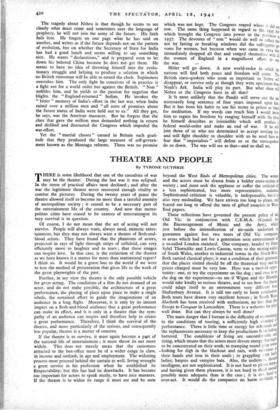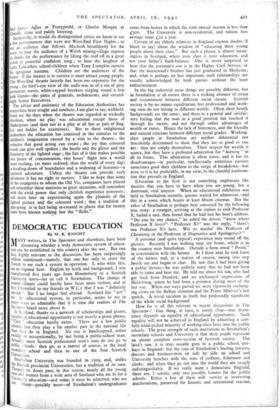THEATRE AND PEOPLE
By TYRONE GUTHRIE
HERE is some likelihood that one of the casualties of war T may be the theatre: During the last war it was eclipsed. In the stress of practical affairs taste declined ; and after the war the legitimate theatre never recovered enough vitality to combat the pictures. During the twenty years of peace the theatre allowed itself to become no more than a tasteful amenity of metropolitan society ; it ceased to be a necessary part of the entertainment life of the country. And now that metro- politan cities have ceased to be centres of entertainment its very survival is in question.
Of course, I do not mean that the art of acting will not survive. People will always want, always need, mimetic enter- tainment, but they may not always want a theatre of flesh-and- blood artists. They have found that the phantoms of actors, projected in rays of light through strips of celluloid, can very efficiently move to laughter and to tears ; that these images can inspire love. In that case, is the extinction of the theatre as we have known it a matter for more than sentimental regret? I think so. It would be a grave loss to the world if we were to lose the method of presentation that gives life to the work of the great playwrights of the past.
Further, in my view the theatre is the only possible vehicle for great acting. The conditions of a film do not demand of an actor, and do not make possible, the architecture of a great performance, the placing of piece upon piece to make a single whole, the sustained effort to guide the imaginations of an audience in a long flight. Moreover, it is only by its instant impact on a flesh-and-blood audience that a great performance can make its effect, and it is only in a theatre that the sym- pathy of an audience can inspire and therefore help to create a great performance. Therefore, I think the survival of the theatre, and more particularly of the serious, and consequently less popular, theatre is a matter of concern.
If the theatre is to survive, it must again become a part of the national life of entertainment ; it must throw its net more widely. This does not merely mean that the customers attracted to the box-office must be of a wider range in class, in income and outlook, in age and employment. The widening process must proceed behind the curtain as well. Irving wrought a great service in his profession when he established its Respectability; but this has had its drawbacks. It has become too important for actors to speak nicely, to have nice manners. If the theatre is to widen its range it must see and be seen beyond the West Ends of Metropolitan cities. The writers and the actors must be drawn from a bolder cross-section of society ; and must seek the applause or suffer the criticism of a less sophisticated, but more representative, audience, Sophisticated criticism is valuable, is indispensable, but it is also very misleading. We have striven too long to please, and feared too long to offend the taste of gifted essayists in West- End papers.
These reflections have governed the present policy of the Old Vic. in conjunction with C.E.M.A. (Council fot the Encouragement of Music and the Arts), which just before the intensification of air-raids undertook to guarantee against loss two tours of Old Vic companies to areas which had not for a generation seen entertainment of a so-called London standard. One company, headed by Dante Sybil Thorndike and Lewis Casson, went to the mining-ralleYs of South Wales, another to industrial towns in the North-West. Both carried classical plays; it was a condition of their guarantee that the places visited should be off the theatrical map and the prices charged must be very low. Here was a twofold oppor- tunity: one, to try the experiment on the dog ; and two, to try' the dog on the experiment—to see if Wigan and the Rhondda would take kindly to serious theatre, and to see how the theatre could adapt itself to an environment very different from Shaftesbury Avenue. It is still too early to form conclusions Both tours have drawn very excellent houses ; in South Wal Macbeth has been received with enthusiasm, no less than She Stoops to Conquer in Lancashire. There is a welcome for pla)1 well done. But can they always be well done? The main danger that I foresee is the difficulty of ru,intaining; in the conditions of touring, a sufficiently high srindard performance. There is little time or. energy for rehearsals and the replacements necessary to keep the productions fr.'In 1°4'16 battered. The conditions • of living are uncomfor.able and tiring, which means that the actors must devote energy Jiat 045 to be concentrated on their work, to tramping round grim t°`vas. -looking for did in the blackout and rain, with slid-cases ...4_ their hands and iron in their souls ; to grappling with land' ladies, harpies and vampire bats. Also, the -audienc,, thclugb • intelligent, are not sophisticated. It is not hard to please thenlj and having given them pleasure, it is not hard to thi:ik °I1°.° possibly more adequate than is the case ; it is nor hard over-act. It would do the companies no harm suidenlY James Agate at Pontypridd, or Charles Morgan at eadle, alone and palely loitering.
Incidentally, it would do distinguished critics no harm to see a few performances that were not West-End First Nights ; to see an audience that follows Macbeth breathlessly for the story; to hear the audience of a Welsh mining-village express its thanks for the performance by lifting the roof off in a great storm of powerful confident song ; to hear the laughter of r,2oo Lancashire school-children when Tony Lumpkin outwits his egregious mamma. Children are the audiences of the future. If the theatre is to survive it must attract young people. The West-End theatre latterly has been too expensive for the young the bird's-eye view of the stalls was as of a sea of grey permanent waves, white-capped breakers surging round a few pink islands—the pates of generals, archdeacons, and exceed- ingly Senior Executives.
The advice and assistance of the Education Authorities has everywhere been sought and nowhere, I am glad to say, withheld. Gone are the days when the theatre was regarded as wickedly frivolous, when no play was educational except those of Shakespeare (and then not as a play at all but as part of Eng. Lit. and fodder for examinees). But to these enlightened authorities the education has 'consisted in the stimulus to the children's imagination caused by a visit to the theatre ; the stimulus that good acting can create ; the joy that coloured words can give well spoken ; the bustle and the glitter and the flummery of the lighted stage ; the fun of it that makes possible two hours of concentration, two hours' flight into a world more exciting, yet more ordered, than the world of every day; a breaking-down of boundaries and a widening of horizons—a spiritual adventure. Unless the theatre can. provide such adventure it has no right to survive. I like to hope that some of the youngsters to whom the Old Vic. companies have played will remember these matinees as great occasions, will remember with the-vivid. power that only childish experience possesses ; will insist later on experiencing again the pleasure of the lighted picture and the coloured word ; that a tradition of play-going is in fact being re-created in places that for twenty years have known nothing but the " flicks."



























 Previous page
Previous page